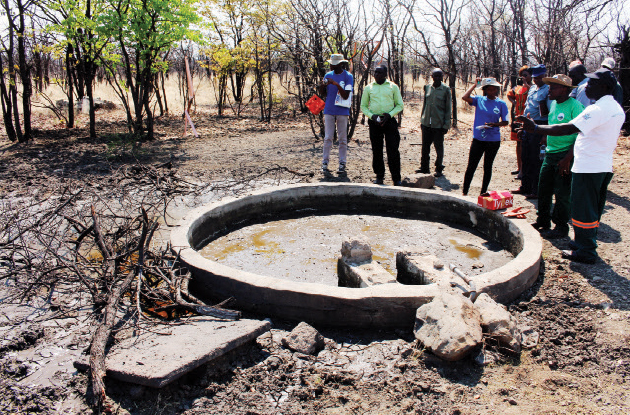EMA de-contaminates cyanide pool


Officers from Environmental Management Agency, Zimbabwe Republic Police and Zimbabwe Parks and Wildlife Authority at a water point where more than 200 birds, a warthog, a cheetah and three Zebras were poisoned at Dingwall Ranch in Nyamandlovu
Whinsley Masara Chronicle Reporter
THE Environmental Management Agency (EMA) has de-contaminated a pool in Nyamandlovu in which poachers poured cyanide to kill animals. Three zebras, a warthog and a cheetah as well as hundreds of birds died after drinking from the pool at Dingwall Ranch.
Villagers use cyanide to poison game like elephants and rhinos as it kills instantly and does not make the noise of a firearm, which attracts game rangers and the police.
Matabeleland North Provincial Environmental Manager Chipo Mpofu-Zuze said the thorough work of de-contaminating the poison had been done on the ground to avert the death of more animals.
“It takes a lot of hard work to neutralise poisoned land and in this case it took EMA three days to clean the poisoned ranch. Big machinery had to be used as a large area of more than 500 square metres needed to be de-contaminated and some structures were demolished to ensure thorough cleansing.
“Soil samples were taken to the labs to find out the amount of poison applied onto the area and those tests are quite expensive,” said Mpofu-Zuze.
She urged villagers to stop using cyanide to kill animals, saying the environmental after effects were far-reaching.
Mpofu-Zuze said a poacher would be targeting one animal but the poison kills aquatic animals, plants, insects and animals that drink from the water source and even those who feed on the carcasses of poisoned animals. “This is unnecessary destruction caused by some mean people to land, animals and creatures,” she said. “These cyanide cases are becoming infamous and only stiff custodial sentences can deter poachers from using it.”
Thandi Bower, the owner of the ranch, said she suspected the poachers were well versed with operations at the ranch.
“Previously my ranch got burnt down and now its animal poisoning. I’m in shock. What will these people do next?” she asked.
“I fear for my workers and myself because if one is able to kill animals with such impunity, it means he can kill even humans.”
Bower said she believed the pool was safe after the EMA clean-up.
Earlier this week, 14 elephants were poisoned with cyanide at Matusadona National Park in Kariba and at Hwange National Park.
The incident comes two years after poachers killed more than 300 elephants, also through cyanide poisoning, in Hwange.
Zimbabwe’s National Parks and Wildlife Management Authority spokesperson Caroline Washaya-Moyo could not be reached for comment.











Comments